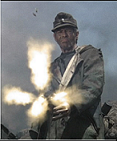Capt. Harlock
Posts: 5358
Joined: 9/15/2001
From: Los Angeles
Status: offline

|
150 Years Ago Today:
After a council of war the previous day, Robert E. Lee formalized his plans. The Union garrison at Harpers Ferry had been increased to 12,000 men. This was no match for the Army of Northern Virginia in a straight fight, but such a force of Yankees in Lee's rear could completely cut his supply line. On the other hand, if such a number could be captured with all their guns and equipment, it would be a powerful boost to the campaign. And Lee had a major advantage in Stonewall Jackson, who had commanded the Confederate occupation of the place at the beginning of the war. He knew (and so did anyone familiar with the geography of the place) that Harpers Ferry was essentially indefensible to a force commanding the heights surrounding the town.
Therefore, Lee directed that a substantial part of his army would be broken off and converge on Harpers Ferry, enveloping it from three directions. He dictated the instructions to his adjutant, Robert H. Chilton:
SPECIAL ORDERS No. 191.
HDQRS. ARMY OF NORTHERN VIRGINIA,
September 9, 1862.
I. The citizens of Fredericktown being unwilling, while overrun by members of his army, to open their stores, in order to give them confidence, and to secure to officers and men purchasing supplies for benefit of this command, all officers and men of this army are strictly prohibited from visiting Fredericktown except on business, in which case they will bear evidence of this in writing from division commanders. The provost-marshal in Fredericktown will see that his guard rigidly enforces this order.
II. Major Taylor will proceed to Leesburg, Va., and arrange for transportation of the sick and those unable to walk to Winchester, securing the transportation of the country for this purpose. The route between this and Culpeper Court-House east of the mountains being unsafe will no longer be traveled. Those on the way to this army already across the river will move up promptly; all others will proceed to Winchester collectively and under command of officers, at which point, being the general depot of this army, its movements will be known and instructions given by commanding officer regulating further movements.
III. The army will resume its march tomorrow, taking the Hagerstown road. General Jackson's command will form the advance, and, after passing Middletown, with such portion as he may select, take the route toward Sharpsburg, cross the Potomac at the most convenient point, and by Friday morning take possession of the Baltimore and Ohio Railroad, capture such of them as may be at Martinsburg, and intercept such as may attempt to escape from Harper's Ferry.
IV. General Longstreet's command will pursue the main road as far as Boonsborough, where it will halt, with reserve, supply, and baggage trains of the army.
V. General McLaws, with his own division and that of General R. H. Anderson, will follow General Longstreet. On reaching Middletown will take the route to Harper's Ferry, and by Friday morning possess himself of the Maryland Heights and endeavor to capture the enemy at Harper's Ferry and vicinity.
VI. General Walker, with his division, after accomplishing the object in which he is now engaged, will cross the Potomac at Cheek's Ford, ascend its right bank to Lovettsville, take possession of Loudoun Heights, if practicable, by Friday morning, Keys' Ford on his left, and the road between the end of the mountain and the Potomac on his right. He will, as far as practicable, co-operate with Generals McLaws and Jackson, and intercept retreat of the enemy.
VII. General D. H. Hill's division will form the rear guard of the army, pursuing the road taken by the main body. The reserve artillery, ordnance, and supply trains, &c., will precede General Hill.
VIII. General Stuart will detach a squadron of cavalry to accompany the commands of Generals Longstreet, Jackson, and McLaws, and, with the main body of the cavalry, will cover the route of the army, bringing up all stragglers that may have been left behind.
IX. The commands of Generals Jackson, McLaws, and Walker, after accomplishing the objects for which they have been detached, will join the main body of the army at Boonsborough or Hagerstown.
X. Each regiment on the march will habitually carry its axes in the regimental ordnance wagons, for use of the men at their encampments, to procure wood, &c.
By command of General R. E. Lee:
R. H. CHILTON,
Assistant Adjutant-General.
But now Stonewall Jackson committed a major security breach. By section VII, General D. H. Hill and his divison would be detached from Jackson's command. As it happened, Hill was Jackson's brother-in-law, being married to the sister of Jackson's wife. To make sure Hill understood the situation as soon as possible, Jackson himself thoughtfully wrote a copy of Special Orders 191, and had it immediately sent by courier.
For the Confederacy, good intentions would indeed pave the road to hell.
Map by Hal Jespersen, www.cwmaps.com

 Attachment (1) Attachment (1)
_____________________________
Civil war? What does that mean? Is there any foreign war? Isn't every war fought between men, between brothers?
--Victor Hugo
|
 Printable Version
Printable Version




























 New Messages
New Messages No New Messages
No New Messages Hot Topic w/ New Messages
Hot Topic w/ New Messages Hot Topic w/o New Messages
Hot Topic w/o New Messages Locked w/ New Messages
Locked w/ New Messages Locked w/o New Messages
Locked w/o New Messages Post New Thread
Post New Thread